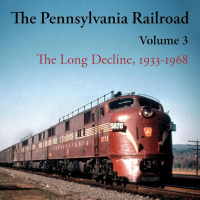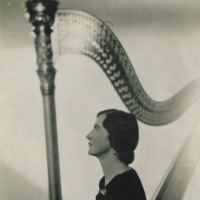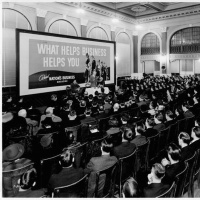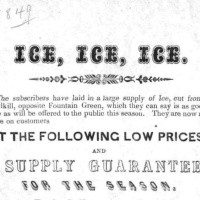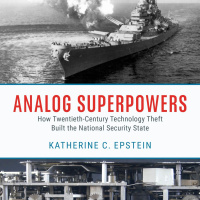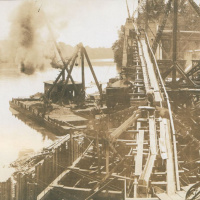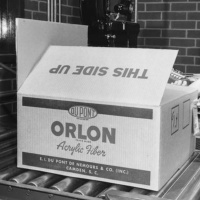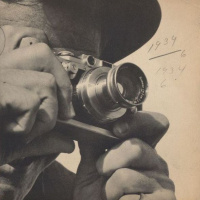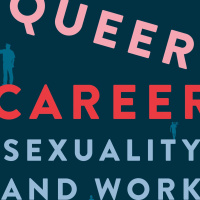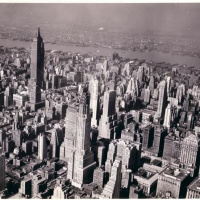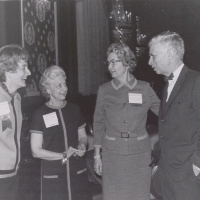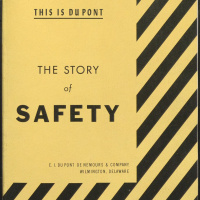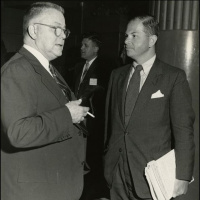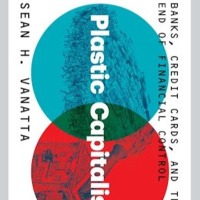Synopsis
Podcast by Hagley Museum and Library
Episodes
-
The Pennsylvania Railroad: The Long Decline, 1933-1968 with Albert Churella
28/04/2025 Duration: 03h16minHagley’s Ben Spohn interviews Albert Churella about the final volume in his landmark trilogy on the history of the Pennsylvania Railroad. From the publisher: “The final volume of Albert J. Churella's landmark series, The Pennsylvania Railroad, concludes the story of the iconic transportation company, covering its long decline from the 1930s to its merger with the New York Central Railroad in 1968. Despite some parallels with World War I, the experience of World War II had a substantially different impact on the Pennsylvania Railroad. The introduction of new technologies, personnel, and commuter routes had significant effects on this giant of American transportation. The recession of 1958 sparked a period of decline from which it and many other railroads struggled to fully recover. The Pennsylvania Railroad: The Long Decline, 1933-1968 provides an unparalleled look at the final years of this legendary company, which in its prime was the largest corporation in the world, with a budget second only to that o
-
Sound & Music in the du Pont Women's World in the Age of Revolution with Rebecca Geoffroy-Schwinden
14/04/2025 Duration: 22minWhere can you find music in the archive? Everywhere, if you know how to look. So argues our guest musicologist Rebecca Geoffroy-Schwinden, associate professor at the University of North Texas and former NEH-Hagley postdoctoral fellow. In this episode, Dr. Geoffroy-Schwinden discusses her latest book project about amateur music making in the Francophone world during the Age of Revolution. Her particular focus is on the meaning of music in the private lives of women around the Atlantic world, women like those in the du Pont family. When Geoffroy-Schwinden delved into the archive she was stunned and delighted to find music everywhere, hidden in plain sight. In support of her work Geoffroy-Schwinden received funding from the Center for the History of Business, Technology, and Society at the Hagley Museum and Library. For more Hagley History Hangouts, and more information on our research funding opportunities, please visit us at Hagley.org.
-
International Business Associations & Regulations on Multinational Corporations with Maia Müller
31/03/2025 Duration: 22minThe mid-twentieth century emergence of multinational corporations wealthier and more powerful than many nations presented a problem for organizations tasked with overseeing international cooperation and development. How to create a regulatory framework around multinationals that would protect the interests of disadvantaged peoples and regions, while not limiting the ability of multinational corporations to deliver economic development. In turn, international business associations reacted to this push toward regulation with a well-organized opposition. In her dissertation research, Maia Müller, PhD candidate at the University of Lausanne, examines the role of business associations in the struggle over regulation of multinational corporations between the 1960s and 1990s. These powerful lobbying organizations provided a unified and legitimizing voice advocating for the perceived interests of the business community, one increasingly dominated by multinational corporations. Her transnational study reveals the sec
-
On Ice: America's Nineteenth-Century Ice Age and the Making of Modern Life with Andrew Robichaud
17/03/2025 Duration: 32minIce, ice, baby. In nineteenth-century America ice was everywhere. Extracted from northern ponds and shipped around the world, ice became a valuable commodity and a vital input in numerous industries. In his latest research Dr. Andrew Robichaud, Associate Professor of History at Boston University, explores the ice industry in nineteenth-century America and its many and complex impacts. From fruit to beer, from cattle carcasses to human cadavers, American ice had its role to play. In support of his work, Dr. Robichaud received funding from the Hagley Center for the History of Business, Technology, and Society at the Hagley Museum and Library. For more information, and more Hagley History Hangouts, join us online at Hagley.org.
-
Analog Superpowers: Technology Theft and the National Security State with Kate Epstein
03/03/2025 Duration: 45minRoger Horowitz talks with Katherine Epstein about her new book Analog Superpowers: How Twentieth-Century Technology Theft Built the National Security State (University of Chicago Press, 2024). From the publisher: “A gripping history that spans law, international affairs, and top-secret technology to unmask the tension between intellectual property rights and national security. At the beginning of the twentieth century, two British inventors, Arthur Pollen and Harold Isherwood, became fascinated by a major military question: how to aim the big guns of battleships. These warships—of enormous geopolitical import before the advent of intercontinental missiles or drones—had to shoot in poor light and choppy seas at distant moving targets, conditions that impeded accurate gunfire. Seeing the need to account for a plethora of variables, Pollen and Isherwood built an integrated system for gathering data, calculating predictions, and transmitting the results to the gunners. At the heart of their invention was th
-
The Nature of War: Environment and Industry in the U.S. During WWI with Gerard Fitzgerald
17/02/2025 Duration: 26minFar from the battlefield the First World War spurred a massive increase in industrial output in the United States. Arms and armaments, ships and steel, a vast stream of materiel poured from American factories, mines, and mills to feed the insatiable maw of war. The consequent strain placed on American railroad infrastructure left it vulnerable to environmental disruption, such as that caused by the great blizzard of 1916-17. These developments marked a significant chapter in the environmental history of American industry. In this episode of the Hagley History Hangout we chat with Gerard Fitzgerald, visiting fellow at the Greenhouse Center for Environmental Humanities at the University of Stavanger and lecturer in the Department of Engineering and Society at the University of Virginia, whose latest research considers the environmental context of industrialization in the United States during World War One. In support of his work Fitzgerald has received funding from the Center for the History of Business, Te
-
Securing the System: Phone Phreaks, Hackers, and Political Order, 1963-2013 with Jacob Bruggeman
06/01/2025 Duration: 31minLarge technological systems can be vulnerable to manipulation, perhaps especially when they are centralized, monopolistic, and complacent. That was the situation in American telecommunications in the early 1960s when a generation of hackers developed techniques to manipulate the Bell telephone system to their advantage, a practice known as phone phreaking. In his dissertation research, Jacob Bruggeman, PhD candidate at the Johns Hopkins University, digs into the technology and politics of hackers, tracing their trajectory from anti-establishment actors on the fringes of technological systems, to positions of influence and control over the very same systems. In parallel to these developments in the hacker community, major organizations, both public and private, adopted new positions and policies designed to secure the system. In support of his research, Bruggeman received funding from the Center for the History of Business, Technology, and Society at the Hagley Museum and Library. For more information, and
-
Racial Economies of Early Jazz with Stephanie Doktor
23/12/2024 Duration: 28minWhat is jazz and when did it begin? Music scholars do not agree. Taking an archival perspective, however, clarifies the dilemma and allows us to see jazz where people at the time performed, recorded, consumed, and discussed what they thought of as jazz music. The emergence of jazz as an economic force, and a defining cultural aspect of an era, were tightly bound up in the prevailing system of racism, segregation, and inequality in the early twentieth-century United States. In her latest book project, Stephanie Doktor, assistant professor of Music Studies at Temple University, explores the racial context within which the jazz recording industry developed, and the indelible mark left by the systemic racism of the period upon the music industry to the present day. Using the Victor-RCA records held in the Hagley Library, Dr. Doktor reveals how race, class, and gender mutually shaped the political economy of early jazz. In support of her work, Dr. Doktor received funding from the Center for the History of Busin
-
Management as Design: Industrial Designers and Business Culture with Penelope Dean
09/12/2024 Duration: 24minTracing the circulation of ideas can cast light on patterns of interaction between various people and institutions in the past. During the mid-late twentieth century, a circuit of ideas linked business culture, industrial designers, academia, and related professional organizations. The movement of values, techniques, and perspectives between these distinct but interpenetrative spaces illuminates how they related to one another in historical context. In her latest research Penelope Dean, professor of architecture at the University of Illinois at Chicago, uncovers this movement of ideas and uses it to bring business and design histories into conversation. Using numerous collections held in the Hagley Library, including the Raymond Loewy and Ernest Dichter collections, Dean identifies the spread of ideas between business and design, and the development of a shared language capable of communicating complex concepts across professional groups. In support of her work Dr. Dean received funding from the Center for
-
Plasticizing China: A Cultural History of Everyday Things, 1960-1990 with Yaxi Liu
04/12/2024 Duration: 19minChinese plastic is cheap and abundant. It wasn’t always. The ubiquity of plastic in twenty-first century consumer culture belies its past rarity and the many cultural meanings it has borne over time. How did plastic come to play such a central role in the economy of China? In her dissertation research Yaxi Liu, PhD candidate at the University of Oxford, reveals the story of plastic’s introduction to the Chinese market and the varied political and cultural meanings assigned to plastic in China. The first plastic introduced to China was acrylic fiber. The technology transfer necessary derived from Britain and from Dupont in the USA. The state reserved for itself a monopoly on plastic production for decades, and the material gained a reputation for scarcity and luxury. Following the emergence of plastic recycling and secondary manufacturing in rural districts, the material came to be associated with cheapness and low status. The Center for the History of Business, Technology, and Society supports research in
-
“Keep Within Compass”: Geographies of Girlhood in the American South, 1783-1865 with Emily Wells
02/12/2024 Duration: 22minThe experience of girlhood in early national and antebellum America was both circumscribed and liberated by geography. Spaces defined who American girls were expected to be. Spaces, too, allowed girls to redefine themselves and to defend themselves against irksome expectations. Looking backward, the geographies of girlhood can be read as evidence of lives both intimate and public. While the “Southern Belle” occupies an outsized position in the popular imagination of the American past, does this caricature reflect actual lived experiences and identities? In her dissertation research Emily Wells, PhD candidate at the College of William & Mary, aims to find out. By investigating and recreating the geographies of girlhood in the American South, as defined by the legal practice of chattel slavery, among upper class white families, Wells seeks to go beyond the Scarlet O’Hara archetype to understand how girls defined themselves and understood their worlds. Wells suggests that before the Civil War, girls in the Amer
-
Negating Visions: Cultural Memory and Media Negatives with Stefka Hristova
25/11/2024 Duration: 14minThe positive image cannot exist without the negative, and the relationship between the two reveals the fundamental nature of the image as fungible, media as a process, and truth value as a matter of interpretation. Scholarship and conservation therefore have a profound responsibility to collect, preserve, and interpret media negatives for what they reveal about the relationship between positive images and the truth. In her latest project, Dr. Stefka Hristova, associate professor at Michigan Technological University, theorizes the relationship between media negatives, their positive counterparts, and the truth value accessible through a careful study of both. Using the collections held in the Hagley Library, Hristova demonstrates that a photographic image cannot be understood without reference to its negative. Likewise, and with profound implications for our present moment, the images and other media generated algorithmically cannot be properly judged or interpreted without an understanding of their negatives
-
Queer Career: Sexuality and Work in Modern America with Margot Canaday
11/11/2024 Duration: 49minIn this episode of Hagley History Hangout Roger Horowitz interviews Margot Canaday about her remarkable book Queer Career: Sexuality and Work in Modern America that received the received 2024 Hagley Prize for the best book in business history that year. Canaday’s Queer Career’s rincipal focus is on the private sector, business enterprises large and small, and traces the opportunities, obstacles, and accomplishments of LGBT+ people as they sought to make a living from the 1950s through today. She emphasizes that as federal and many state agencies routinely refused to hire LGBT+ people, their most important sources of employment was in the private sector. Still facing pressures to keep their sexuality hidden in their jobs, their precarity lead them to accept lesser positions and pay than they might otherwise would have qualified for. Once stablished, they nonetheless made great strides in economic opportunity over these decades in white collar and blue collar jobs, and by creating their own firms. Her ana
-
New York City’s Urban Heat Island, 1860-2020 with Kara Schlichting
28/10/2024 Duration: 29minExcessive heat has presented a problem for public health officials in New York City since the mid-nineteenth century building boom that covered the island of Manhattan in bricks, concrete, and other heat-storing materials. Prior to that, however, Americans had noticed that cities were warmer than their surrounding countryside as early as the 1790s. The phenomenon now known as the “urban heat island” has shaped the bodily experiences and collective destinies of millions. In her latest research, Dr. Kara Schlichting, associate professor at the City University of New York, uncovers the complex relationship between the evolving built environment of the city, the macro-climatic conditions prevailing globally, and the socially-differentiated lived experiences of heat had by city residents. By digging into Hagley collections, including trade catalogs and the Willis Carrier collection, Schlichting is able to tell a history that links multiple scales of time and space, an act of scholarly imagination that allows us
-
Manufacturing Self-Determination: Industry on Native American Reservations with Sam Schirvar
14/10/2024 Duration: 27minThe political meaning of industry depends upon its context. Following the Second World War, Native American tribal governments engaged in a program of industrial development meant to secure the political self-determination of their nations. Initially concerned with attracting capital investment to reservation communities, by the 1970s native governments had moved on to become investors in wholly owned tribal enterprises. In his dissertation research, Sam Schirvar, PhD candidate at the University of Pennsylvania uncovers a story that is both surprising and revealing of deeper patterns in American history. While outsiders saw industrial development as a means to efface native communities and tribal governments, tribal leaders themselves saw it as a means to self-determination. While the wider American economy was moving toward privatization of enterprise, Native Americans were creating publicly owned industries. Industry can mean different things to different people at different times. In support of his res
-
Back on Track American Railroad Accidents and Safety 1965-2015 with Mark Aldrich
30/09/2024 Duration: 57minBen Spohn interviews Mark Aldrich about his 2018 book, Back on Track American Railroad Accidents and Safety 1965-2015. This period marked a decline in safe operating on American railroads through the 1970s which were followed by a period of increased safety and profitability for American railroads. Aldrich makes the case that the joint factors of economic deregulation through the Staggers Act and the federalization of railroad safety via the Federal Railroad Administration (FRA) drew attention to safety issues on the railroad like poor track condition, unsafe grade crossings, or engineer fatigue and left railroads with not only incentives to become safer, but enough money in their coffers to adequately shore up these safety concerns. Mark Aldrich is the Marilyn Carlson Nelson Professor of Economics emeritus at Smith College. Back on Track American Railroad Accidents and Safety 1965-2015 is a sequel to Aldrich’s earlier book on railroad safety, Death Rode the Rails: American Railroad Accidents and Safety, 18
-
Health, Safety, & Risk Communication at DuPont in the Twentieth Century with Madison Krall
16/09/2024 Duration: 22minThe DuPont firm was a leader in workplace and community safety communications during the twentieth century. This had been baked into the company culture from the first, as gunpowder manufacturing made essential. What changed over time were the techniques and media of communication, and the intended audience targeted by the company’s messaging. In her latest research, Madison Krall, assistant professor of communication studies at Seton Hall University, explores the wealth of health and safety materials generated by the DuPont company during the twentieth century. From posters to motion pictures, the firm deployed a wide array of media to promote safety in the workplace and beyond. DuPont wished to convince the public that its products were safe, and to convince employees and community members that safety was their responsibility. In support of her work Dr. Krall received funding from the Center for the History of Business, Technology, and Society at the Hagley Museum and Library. For more Hagley History Han
-
Forging the Network: International Industrial Conferences, 1957-1997 with Grigorios Antoniou
02/09/2024 Duration: 21minScholars often think and write about business diplomacy as something that happens between firms and national governments. But the historical pattern is more complex than that, with contacts between businesses forming a significant portion of the international circuit of communication about business and economic matters. As part of his doctoral research, Grigorios Antoniou, PhD candidate at the National and Kapodistrian University of Athens, is exploring the significance of international industrial conferences to the development of a global network that linked high-level business leaders from across boundaries between industries, sectors, and countries. Using collections held in the Hagley Library, including the National Industrial Conference Board and trade catalog collections, Antoniou uncovers a milieu in which elites met to mingle, cut deals, and burnish their status. For more Hagley History Hangouts, more information on the Center for the History of Business, Technology, and Society, and our many resear
-
Plastic Capitalism: Banks, Credit Cards & the End of Financial Control with Sean Vanatta
19/08/2024 Duration: 50minAmerican households are awash in expensive credit card debt. But where did all this debt come from? In this history of the rise of postwar American finance, Sean H. Vanatta shows how bankers created our credit card economy and, with it, the indebted nation we know today. America’s consumer debt machine was not inevitable. In the years after World War II, state and federal regulations ensured that many Americans enjoyed safe banks and inexpensive credit. Bankers, though, grew restless amid restrictive rules that made profits scarce. They experimented with new services and new technologies. They settled on credit cards, and in the 1960s mailed out reams of high-interest plastic to build a debt industry from scratch. In the 1960s and ’70s consumers fought back, using federal and state policy to make credit cards safer and more affordable. But bankers found ways to work around local rules. Beginning in 1980, Citibank and its peers relocated their card plans to South Dakota and Delaware, states with the weakes
-
The Northeast Corridor: The Trains, the People, the History, the Region with David Alff
05/08/2024 Duration: 47minHagley’s Ben Spohn interviews David Alff about his recent book: The Northeast Corridor: The Trains, the People, the History, the Region. In this comprehensive history of America’s most heavily-traveled rail line, Alff shows ow what began as a series of disconnected nineteenth century rail lines became the spine connecting America’s Megalopolis, the dense urban forest connecting Boston with Washington D.C., with New York,Trenton, Philadelphia, Wilmington, and Baltimore in between. As Alff explains, the Northeast Corridor is always arriving as the many small railroads that provided service to the Corridor, after over a century of corporate mergers, and laying new rails and electrifying old ones, came to fall under the stewardship of one railroad, the Penn Central before it fell into bankruptcy. The U.S. government created Amtrak, partly in response to this crisis and it took on passenger service on the Northeast Corridor and nationwide. The Northeast Corridor remains a work in progress with the latest link

